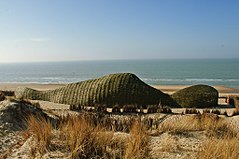
Back فلسفة بيئية Arabic पर्यावरणी दर्शन Bihari পরিবেশ দর্শন Bengali/Bangla Environmentální filozofie Czech Filosofía medioambiental Spanish فلسفه محیط زیست Persian Ympäristöfilosofia Finnish Philosophie de l'environnement French חשיבה סביבתית HE पर्यावरण दर्शन Hindi
Environmental philosophy is the branch of philosophy that is concerned with the natural environment and humans' place within it.[1] It asks crucial questions about human environmental relations such as "What do we mean when we talk about nature?" "What is the value of the natural, that is non-human environment to us, or in itself?" "How should we respond to environmental challenges such as environmental degradation, pollution and climate change?" "How can we best understand the relationship between the natural world and human technology and development?" and "What is our place in the natural world?" Environmental philosophy includes environmental ethics, environmental aesthetics, ecofeminism, environmental hermeneutics, and environmental theology.[2] Some of the main areas of interest for environmental philosophers are:

- Defining environment and nature
- How to value the environment
- Moral status of animals and plants
- Endangered species
- Environmentalism and deep ecology
- Aesthetic value of nature
- Intrinsic value
- Wilderness
- Restoration of nature
- Consideration of future generations[1]
- Ecophenomenology
- ^ a b Belshaw, Christopher (2001). Environmental Philosophy. Chesham: Acumen. ISBN 1-902683-21-8.
- ^ "International Association of Environmental Philosophy". Retrieved 2008-07-30.